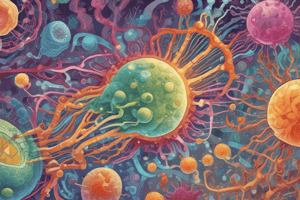Podcast
Questions and Answers
What is the function of autophagosomes?
What is the function of autophagosomes?
- Create new proteins in the cytoplasm
- Release cytoplasmic content into the extracellular space
- Transport proteins to the Golgi apparatus
- Contain cytoplasmic content and fuse with lysosomes (correct)
Under what conditions do autophagosomes form?
Under what conditions do autophagosomes form?
- In the presence of a pathogen (correct)
- After organelle repair
- In nutrient-rich environments
- In the absence of stress
What is the main mechanism of rejection of transplanted organs?
What is the main mechanism of rejection of transplanted organs?
- Direct recognition
- Autophagy
- MHC restriction
- Allorecognition (correct)
What is the difference between direct and indirect allorecognition?
What is the difference between direct and indirect allorecognition?
Which genes encode the alpha and beta chain of MHC Class II molecules?
Which genes encode the alpha and beta chain of MHC Class II molecules?
What does polymorphism refer to in terms of MHC genes?
What does polymorphism refer to in terms of MHC genes?
Where are HLA genes located in humans?
Where are HLA genes located in humans?
Which T cell recognition involves targeting regardless of the peptide presented?
Which T cell recognition involves targeting regardless of the peptide presented?
What percentage of all T cells in an organism can react to non-self MHC molecules?
What percentage of all T cells in an organism can react to non-self MHC molecules?
What characteristic does a locus represent?
What characteristic does a locus represent?
How many HLA-A alleles are there in the range of HLA-A1 to HLA-A2041?
How many HLA-A alleles are there in the range of HLA-A1 to HLA-A2041?
What term describes the particular combination of MHC alleles found on a single chromosome?
What term describes the particular combination of MHC alleles found on a single chromosome?
How many different MHC-I alleles can be expressed in an individual, considering inheritance from both parents?
How many different MHC-I alleles can be expressed in an individual, considering inheritance from both parents?
What feature of MHC genes makes human transplantation difficult?
What feature of MHC genes makes human transplantation difficult?
Where do most differences in MHC expression exist within the molecule?
Where do most differences in MHC expression exist within the molecule?
Which term describes having multiple genes that encode for proteins with the same function?
Which term describes having multiple genes that encode for proteins with the same function?
What process involves cytosolic peptides being presented on MHC Class II through autophagy?
What process involves cytosolic peptides being presented on MHC Class II through autophagy?
What is the unique ability of dendritic cells in the immune system?
What is the unique ability of dendritic cells in the immune system?
How are dendritic cells 'licensed' to perform cross-presentation of antigens?
How are dendritic cells 'licensed' to perform cross-presentation of antigens?
What is the role of a CD4+ T cell in the process of cross-presentation by dendritic cells?
What is the role of a CD4+ T cell in the process of cross-presentation by dendritic cells?
What is the significance of the 'license' granted by CD4+ T cells to dendritic cells?
What is the significance of the 'license' granted by CD4+ T cells to dendritic cells?
Which type of T cell needs to be activated first for dendritic cells to license and cross-present antigens?
Which type of T cell needs to be activated first for dendritic cells to license and cross-present antigens?
What happens after dendritic cells get permission from CD4+ T cells to redirect exogenous antigens?
What happens after dendritic cells get permission from CD4+ T cells to redirect exogenous antigens?
Why is the redirection of exogenous antigens onto MHC class I molecules important?
Why is the redirection of exogenous antigens onto MHC class I molecules important?
What is the mechanism by which dendritic cells redirect exogenous antigens onto endogenous pathways?
What is the mechanism by which dendritic cells redirect exogenous antigens onto endogenous pathways?
In the context of immune response, what is the role of cross-presentation by dendritic cells?
In the context of immune response, what is the role of cross-presentation by dendritic cells?
How does cross-presentation by dendritic cells contribute to immune surveillance?
How does cross-presentation by dendritic cells contribute to immune surveillance?



